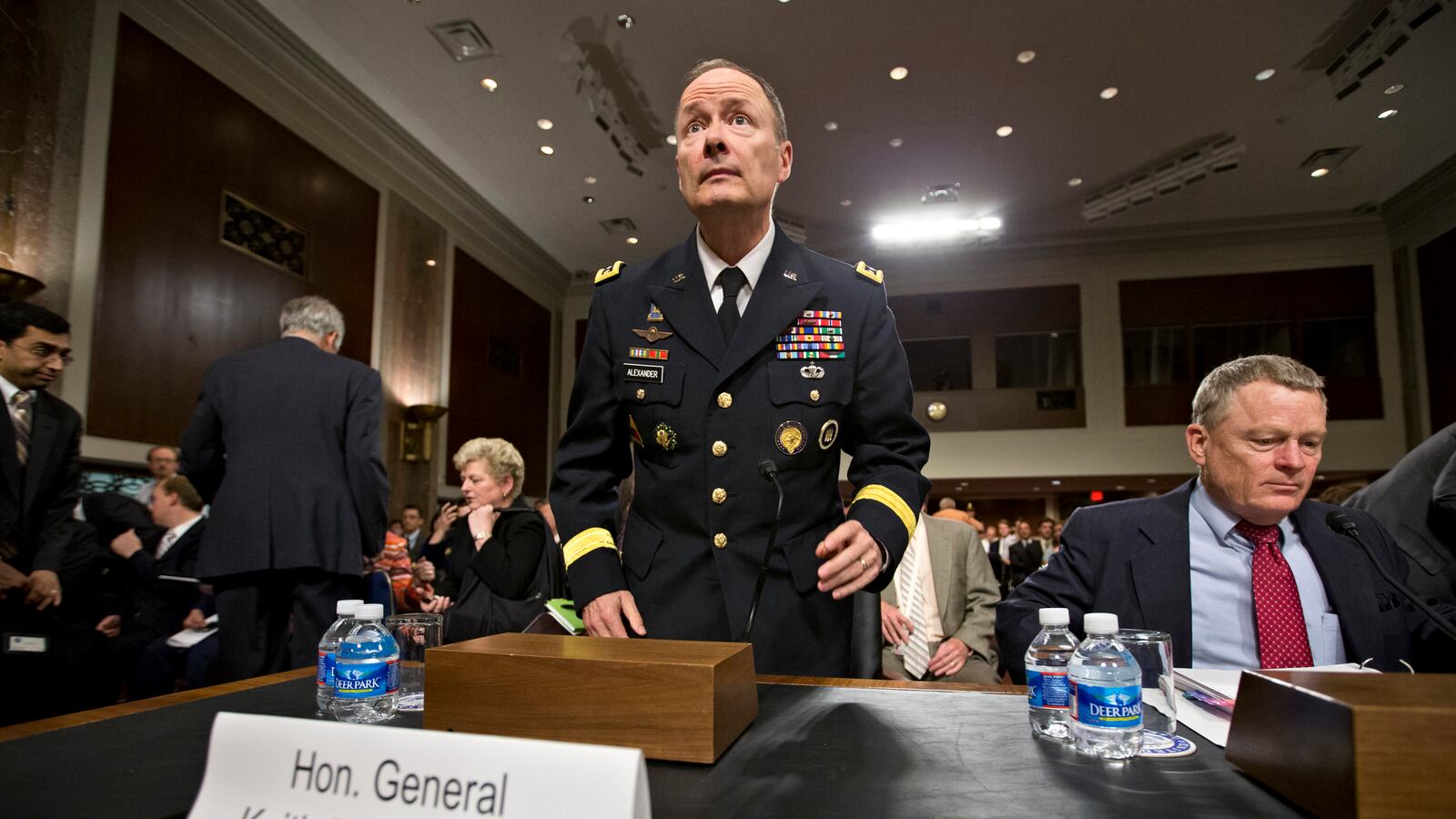The center lives. Bipartisanship is not dead, as Democratic and Republican congressional leaders rally around the National Security Agency’s big data grab. With the exception of op-ed writers, the American Civil Liberties Union, and the Pauls—Rand and Ron—Washington’s establishment is standing together with the administration. In this scrum, party is secondary, at least on Capitol Hill.

In a show of unity virtually unseen since 9/11, the congressional leadership has come out unanimously in support of the status quo, while deflecting allegations that The Guardian’s news story was actually news. According to Senate Majority Leader Harry Reid, senators who complain about being left in the dark have only themselves to blame, and all other Americans should sit down and shut up.
As Reid tells it, “We’ve had many, many meetings that have been both classified and unclassified that members have been invited to.” And the public? “Everyone should just calm down and understand that this isn’t anything that is brand new.”
For his part, Senate Minority Leader Mitch McConnell is singing from Reid's hymnal. In McConnell’s view, “What’s clear ... is that each of these programs is authorized by law, overseen by Congress and the courts, and subject to ongoing and rigorous oversight.” For once, McConnell was uncowed by Rand Paul, Kentucky’s junior senator, who on Thursday indicated that he may join the ACLU’s pending lawsuit challenging the NSA. “When you collect it from a billion phone calls a day, even if you say you’re going to keep the name private, the possibility for abuse is enormous,” said Paul.
On the House side, Speaker John Boehner branded Edward Snowden, the renegade 29-year-old leaker and exile, as a traitor. Boehner said, “These are important national-security programs to help keep Americans safe and give us tools to fight the terrorist threat that we face.” Eric Cantor, the House majority leader, is seemingly more outraged by Snowden’s leak than by his own possible ignorance of the breadth of the government’s spying.
Finally, House Minority Leader Nancy Pelosi, a persistent critic of the PATRIOT Act, declined to criticize Obama or high-tech intrusion in general and has now called for Snowden’s prosecution. Pelosi may have internalized the fact that she has been on the receiving end of over $185,000 in campaign contributions from the computer and Internet industries over the last three election cycles, with names like Eric Schmidt of Google and Sheryl Sandberg of Facebook gracing her donor roster, or maybe that we are under a threat, albeit one markedly different and more diffuse from that posed by the Soviet Union back in the day.
Still, Pelosi’s newfound vigilance is noteworthy. In 2005 she had opposed blanket renewal of the PATRIOT Act and invoked the Founding Fathers in so doing, because they “knew that you cannot have security without liberty, or liberty without security in a democracy.” Two years ago Pelosi criticized the Republican-led Congress for failing “to seize the opportunity to enact measures and improvements needed to preserve Americans’ privacy and to incorporate oversight and compliance with the law.”
Congress is not treating Snowden’s security breach as business as usual, but it is acting like governmental data intrusion is the not-so-new normal. Although the director of national intelligence, James Clapper, may have lied to Congress about the scope of the National Security Agency’s surveillance efforts, few appear eager to confront him. Eric Holder he most certainly is not.
To illustrate, earlier this month, Darrell Issa, the House oversight committee Chairman, had warned the attorney general not to “use perjury lightly” when discussing his role in approving a search warrant for the emails of Fox News reporter James Rosen. By contrast, Issa has not joined with Sen. Ron Wyden, an Oregon Democrat, in calling for oversight hearings to review Clapper’s misleading testimony. Apparently messing with a Fox reporter earns you Issa’s ire, but trifling with the privacy over 300 million Americans only evokes silent reflection from the usually combustible congressman.
But can you really blame Congress for its reluctance to challenge the president or the very legal rubric that Congress itself enacted? As Peggy Noonan put it, “The thing political figures fear most is a terror event that will ruin their careers. The biggest thing they fear is that a bomb goes off and it can be traced to something they did or didn’t do, an action they did or didn’t support.”
Meanwhile, Americans are not demanding that the administration stop doing whatever it is doing. Public opinion is ambivalent, not adamant, with conflicting polls delivering contrary messages. According to a joint Washington Post–Pew Research Center poll, 56 percent find the NSA’s telephone tracking program to be acceptable, while two in five disagree. Still, a later Gallup poll showed a majority of the public opposed to telephone and Internet tracking, with less than two fifths supportive.
In other words, don’t expect much to change, insofar as 9/11 has changed everything where the threat of terror is concerned. Sen. Al Franken, by way of Harvard and SNL, tells us that Prism and the NSA are “not about spying on the American people.” Channeling his inner Stuart Smalley, Franken adds, “There are certain things that are appropriate for me to know that is not appropriate for the bad guys to know.”
On the right, Long Island Congressman Peter King called for the prosecution of Guardian reporter Glenn Greenwald, but conceded that Fox’s Rosen should be given a pass. King defended his selective reading of the First Amendment by claiming that “too many Republicans and conservatives have become Michael Moore. And I think it’s dangerous to our country.”






